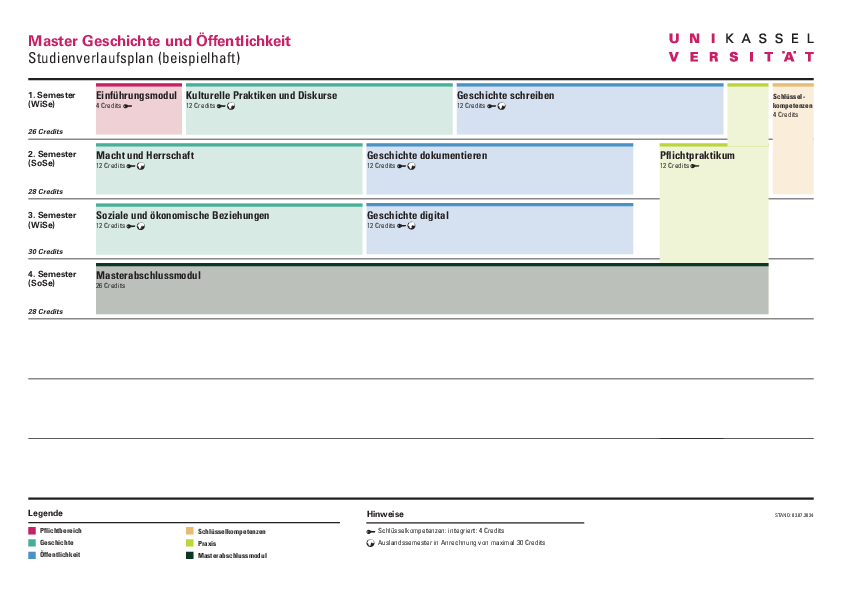Study structure
The content on this page was translated automatically.

Study plan
Module A1 "Cultural Practices and Methods" introduces you to cultural history methods and theory building. You will learn to reconstruct and critically examine cultural contexts of meaning at the practical, discursive, and material levels, and to appropriately apply the central categories of inquiry in cultural history (gender, class, status, race, ethnicity, religion, region, species, etc.). Furthermore, you will be offered larger contexts of cultural history, including across eras, with regional, transfer history, or global cuts.
Module A2 "Power and Domination" ties in with cultural-historical theorizing. Here you will be enabled to formulate multi-perspective explanations of causes for the shaping of historical practices of domination. You will learn to identify differences in the understanding of power and domination and to explain them from the respective historical context. You will also learn to what extent history and historical culture are self-constructed, not free of power relations, and therefore themselves in need of deconstruction.
Finally, in Module A3 "Social and Economic Relations" you will gain an in-depth insight into social and economic historical structures and processes based on exemplary topics. These include, among others, the history of economic systems and economic institutions, modes of production and consumption patterns as well as questions of demography, migration and social inequality and, in general, the history of groups, classes and genders. For their study, you will be trained in the use of the quantitative and qualitative analytical methods of social and economic history.
Module B1 "Writing History" familiarizes you with the basic features of media-historical change and the essential concepts for describing it. In doing so, you will learn to analyze the change of journalistic practice on a national, inter- and transnational level and to embed it in its respective context. You will put into practice the knowledge you have acquired in this way with regard to the different media formats and audience-related representations by writing a variety of texts, which, depending on their focus, are aimed more at a specialist audience or the general public.
Module B2 "Documenting History" deepens your knowledge in dealing with sources and research literature and enables you to critically assess historical material and prepare it for a suitable form of presentation and documentation. To this end, you will research published and unpublished sources and learn to analyze them using methods from the fields of history and cultural studies. You will also deal with forms of presentation and documentation of history and critically question the narratives chosen in each case. In cooperation with our local collaborative partners, you will have the opportunity to apply your knowledge and will be empowered to create independent projects to mediate between academia and the public.
Module B3 "History digital" provides you with basic knowledge of digital historiography and knowledge about the possibilities and limitations for the use of digital as well as virtual media and tools for historical practice and presentation. You will learn to comprehend the creation and processing of digital data and to engage in well-founded information criticism in the sense of digital hermeneutics. This will enable you to virtually prepare historical content for different audiences.
Practice and mobility
The compulsory internship gives you an insight into the national and international professional world. You will gain experience with everyday processes in institutions that deal with historical reappraisal or mediation in very different ways. In doing so, you will learn to familiarize yourself with unfamiliar fields of work and become qualified for teamwork and practice working independently in a professional environment.
The compulsory internship can be completed both in Germany and abroad. You can choose between an eight-week internship or two six-week internships. This choice gives you flexibility in planning your master's program. The History Department maintains contacts with various archives, museums, and institutions that are closely related to work in the field of history and supports you in choosing your internship. Ultimately, however, it is you who decides on your choice of internship site and your non-university focus.
During an internship or study abroad you will acquire organizational, personal and intercultural skills. Furthermore, you can deepen spatial emphases that you have set in your studies. There are numerous possibilities that allow you to go abroad. For example, you can make use of already existing Erasmus+ cooperations of the History Department and get detailed advice for this. The International Office can also help you here. Support in finding and applying for internships abroad (also in English) is also available from the Career Service.
Explanation of your study achievements
The coursework to be completed in the Master "History and the Public Sphere" can "classically" consist of a paper, leading a discussion, moderating a seminar session or lecture event, organizing a panel discussion, a lecture event, a scientific workshop, an excursion program, participation in student projects, questionnaire development, interviews, event conception, group leadership, and the like. They may also include new audiovisual and digital formats such as podcasts, posters, or blogs. The same is true for examination services. Here, classic performance assessments such as homework are just as important as creative, practice-oriented forms of exercise such as essays, exhibition catalogs, or event and project concepts.
Within the master "History and the Public Sphere" you will acquire important key competencies. The term key competencies includes communication, organizational as well as methodological competencies. The proof of the key competences takes place as a course achievement within the modules A1-A3 and B1-B3. These prepare you for lifelong learning, promote your chances on the job market, for example through your ability to familiarize yourself, your social communicative competence and an efficiency-oriented problem-solving behavior.

